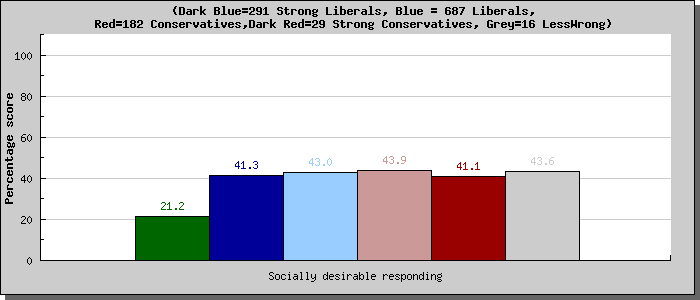|
The scale you just completed was the Marlowe-Crowne
Social Desirability Scale, developed by Douglas Crowne and David Marlowe
(1960). This scale measures social desirability concern, which is
people's tendency to portray themselves favorably during social
interaction. Each of the 33 true-false items that you just filled out
describes a behavior that is either socially acceptable but unlikely, or
socially unacceptable but likely. As a result, people who receive high
scores on this measure may be more likely to respond to surveys in a
self-promoting fashion.
We are interested in examining how liberals and
conservatives score on this scale. Although previous research has
investigated how these groups can be biased when evaluating political
information, little is known about the relationship between political
attitudes and social desirability concern.
The graph below shows your score on this scale.
The scores range from 0% to 100% and represent the proportion of answers
that indicated socially desirable responding. Thus, higher scores
correspond with higher degrees of socially desirable responding. Your
score is shown in green (1st bar). The score of the average liberal respondent is shown in light blue and the score of the average strong liberal is shown in dark blue. The average conservative score is shown in light red and the score of the average strong conservative is shown in dark red.
You are a member of the group:LessWrong and those results are shown with the Grey bar.
To learn more about the Marlowe-Crowne Social Desirability scale, you can read this academic journal article.
Crowne, D. P., & Marlowe, D. (1960). A new scale of social desirability independent of psychopathology. Journal of Consulting Psychology, 24, 349-354.
Return to the "Explore" page.
|
